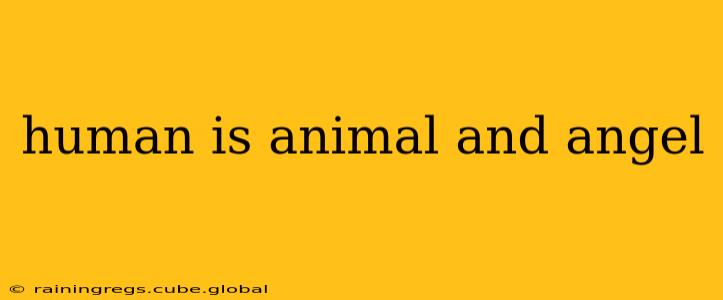Human: Animal, Angel, and Everything In Between
The statement "human is animal and angel" is a provocative one, sparking contemplation on the duality of human nature. While scientifically, we are undeniably animals – primates belonging to the Homo sapiens species – the "angel" aspect delves into the realm of philosophy, religion, and our inherent capacity for altruism, morality, and spiritual transcendence. This exploration delves into the biological realities of our animal nature, while also examining the complex ethical and spiritual dimensions that often distinguish us from other animals.
What makes humans animals?
Biologically, the answer is clear. We share a common ancestor with other primates, exhibiting similar genetic structures, physiological processes, and evolutionary pathways. We possess physical characteristics like bipedalism, opposable thumbs, and a large brain that distinguish us from other animals, but fundamentally, our biological makeup places us firmly within the animal kingdom. We are subject to the same biological imperatives as other animals: survival, reproduction, and the need to satisfy basic needs like food and shelter. Our evolutionary history is intimately intertwined with the animal world, shaped by natural selection and adaptation. Ignoring this biological reality is to ignore a fundamental truth about our existence.
But aren't humans unique? What about our higher cognitive abilities?
Yes, humans are unique. Our capacity for complex language, abstract thought, self-awareness, and symbolic reasoning far surpasses that of any other animal. This cognitive complexity allows us to create art, music, technology, and complex social structures. We have developed intricate legal, ethical, and moral systems guiding our interactions with one another. This capacity for advanced reasoning, however, doesn’t negate our animal origins. Instead, it demonstrates the remarkable evolution of our species. Our advanced cognitive functions are built upon the foundations of our animal heritage.
So, what about the "angel" part? What is the basis of this argument?
The "angel" aspect refers to the uniquely human capacity for empathy, compassion, selflessness, and moral reasoning. Throughout history, numerous religions and philosophical systems have explored the human capacity for good, attributing it to a divine spark or an inherent drive towards something greater than ourselves. Examples of altruistic behavior – from selfless acts of charity to the dedication of individuals to humanitarian causes – demonstrate our capacity for actions seemingly beyond pure self-interest. This capacity for moral reasoning and the pursuit of higher ideals – concepts of justice, equality, and love – are often cited as evidence of a transcendent aspect of human nature, setting us apart from other animals, at least in their expressed forms.
Are humans inherently good or evil?
This is a complex philosophical question with no easy answer. Humans are capable of both incredible acts of kindness and unspeakable acts of cruelty. Our capacity for empathy coexists with our capacity for violence. Understanding this duality is crucial to understanding the human condition. Many believe that our morality and ethics are learned behaviors and societal constructs, molded by cultural and societal influences. This perspective emphasizes the importance of nurturing positive values and ethical frameworks to encourage the “angelic” aspects of human nature.
Can science explain the "angel" in humans?
While science can describe the biological mechanisms underlying human behavior, including empathy and altruism, it struggles to fully explain the motivations behind acts of selfless heroism or profound compassion. The "angel" aspect often transcends purely biological explanations and falls into the realm of the spiritual, existential, or philosophical. Neuroscience can show brain activity related to empathy, but it can’t fully quantify the human experience of selfless love or the drive towards moral perfection.
In conclusion, the statement "human is animal and angel" serves as a powerful reminder of the complexities of the human condition. We are undeniably animals, rooted in our evolutionary history and biological nature. Yet, we possess a unique capacity for morality, altruism, and the pursuit of higher ideals that set us apart, at least to an extent not fully replicated by the animal kingdom. The tension between these two aspects continues to shape our understanding of ourselves and our place in the world.
